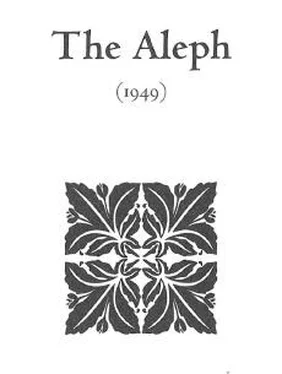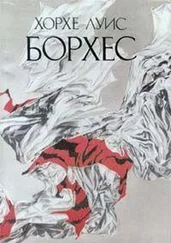Хорхе Борхес - Collected Fictions
Здесь есть возможность читать онлайн «Хорхе Борхес - Collected Fictions» весь текст электронной книги совершенно бесплатно (целиком полную версию без сокращений). В некоторых случаях можно слушать аудио, скачать через торрент в формате fb2 и присутствует краткое содержание. Год выпуска: 1999, ISBN: 1999, Издательство: Penguin (UK), Жанр: Старинная литература, на английском языке. Описание произведения, (предисловие) а так же отзывы посетителей доступны на портале библиотеки ЛибКат.
- Название:Collected Fictions
- Автор:
- Издательство:Penguin (UK)
- Жанр:
- Год:1999
- ISBN:9780140286809
- Рейтинг книги:5 / 5. Голосов: 1
-
Избранное:Добавить в избранное
- Отзывы:
-
Ваша оценка:
- 100
- 1
- 2
- 3
- 4
- 5
Collected Fictions: краткое содержание, описание и аннотация
Предлагаем к чтению аннотацию, описание, краткое содержание или предисловие (зависит от того, что написал сам автор книги «Collected Fictions»). Если вы не нашли необходимую информацию о книге — напишите в комментариях, мы постараемся отыскать её.
Collected Fictions — читать онлайн бесплатно полную книгу (весь текст) целиком
Ниже представлен текст книги, разбитый по страницам. Система сохранения места последней прочитанной страницы, позволяет с удобством читать онлайн бесплатно книгу «Collected Fictions», без необходимости каждый раз заново искать на чём Вы остановились. Поставьте закладку, и сможете в любой момент перейти на страницу, на которой закончили чтение.
Интервал:
Закладка:
THE BATTLE OF RIVINGTON STREET
A hundred or more heroes, none quite resembling the mug shot probably fading at that very moment in the mug books; a hundred heroes reeking of cigar smoke and alcohol; a hundred heroes in straw boaters with bright-colored bands; a hundred heroes, all suffering to a greater or lesser degree from shameful diseases, tooth decay, respiratory ailments, or problems with their kidneys; a hundred heroes as insignificant or splendid as those of Troy or Junin*—those were the men that fought that black deed of arms in the shadow of the elevated train. The cause of it was a raid that Kelly's "enforcers" had made on a stuss game under Monk Eastman's protection. One of Kelly's men was killed, and the subsequent shoot-out grew into a battle of uncountable revolvers. From behind the tall pillars of the El, silent men with clean-shaven chins blazed away at one another; soon, they were the center of a horrified circle of hired hacks carrying impatient reinforcements clutching Colt artillery. What were the protagonists in the battle feeling? First, I believe, the brutal conviction that the senseless, deafening noise of a hundred revolvers was going to annihilate them instantly; second, I believe, the no less erroneous certainty that if the initial volley didn't get them, they were invulnerable. Speculation notwithstanding, behind their parapets of iron and the night, they battled furiously. Twice the police tried to intervene, and twice they were repelled. At the first light of dawn, the battle died away, as though it were spectral, or obscene. Under the tall arches raised by engineers, what remained were seven men gravely wounded, four men dead, and one lifeless pigeon.
THE CRACKLE OF GUNFIRE
The ward politicians for whom Monk Eastman worked had always publicly denied that such gangs existed, or had clarified that they were merely social clubs. The indiscreet battle on Rivington Street alarmed them. They called in Eastman and Kelly and impressed upon them the need to declare a truce. Kelly, who recognized that politicians were better than all the Colts ever made when it came to dissuading the police from their duty, immediately saw the light; Eastman, with the arrogance of his great stupid body, was spoiling for more grudge fights and more bullets. At first, he wouldn't hear of a truce, but the politicos threatened him with prison. Finally the two illustrious thugs were brought together in a downtown dive; each man had a cigar clenched in his teeth, his right hand on his gun, and his watchful swarm of armed bodyguards hovering nearby. They came to a very American sort of decision—they would let the dispute be settled by a boxing match. Kelly was a skilled boxer. The match took place in an old barn, and it was stranger than fiction. One hundred forty spectators watched—toughs in cocked derby hats and women in "Mikado tuck-ups," the high-piled, delicate hairdos of the day. The fight lasted two hours, and it ended in utter exhaustion. Within a week, gunshots were crackling again. Monk was arrested, for the umpteenth time. The police, relieved, derived great amusement from his arrest; the judge prophesied for him, quite correctly, ten years in prison.
EASTMAN VS. GERMANY
When the still-perplexed Monk Eastman got out of Sing Sing, the twelve hundred toughs in his gang had scattered. He couldn't manage to round them up again, so he resigned himself to working on his own. On the 8th of September, 1917, he was arrested for fighting and charged with disturbing the peace. On the 9th, he felt like he needed another sort of fight, and he enlisted in the Army.
We know several details of his service. We know that he was fervently opposed to the taking of prisoners, and that once (with just his rifle butt) he prevented that deplorable practice. We know that once he escaped from the hospital and made his way back to the trenches. We know that he distinguished himself in the conflicts near Montfaucon. We know that afterward he was heard to say that in his opinion there were lots of dance halls in the Bowery that were tougher than that so-called "Great War" of theirs.
THE MYSTERIOUS, LOGICAL END
On the 25th of December, 1920, Monk Eastman's body was found on one of New York's downtown streets. He had been shot five times. A common alley cat, blissfully ignorant of death, was pacing, a bit perplexedly, about the body.*
The Disinterested Killer Bill Harrigan
The image of the lands of Arizona, before any other image—Arizona and New Mexico. A landscape dazzlingly underlain with gold and silver, a wind-blown, dizzying landscape of monumental mesas and delicate colorations, with the white glare of a skeleton stripped bare by hawks and buzzards. Within this landscape, another image—the image of Billy the Kid, the rider sitting firm upon his horse, the young man of loud shots that stun the desert, the shooter of invisible bullets that kill at a distance, like a magic spell.
The arid, glaring desert veined with minerals. The almost-child who died at the age of twenty-one owing a debt to human justice for the deaths of twenty-one men—"not counting Mexicans."
THE LARVAL STATE
In 1859, the man who in terror and glory would be known as Billy the Kid was born in a basement lodging in New York City. They say it was a worn-out Irish womb that bore him, but that he was brought up among Negroes. In that chaos of kinky hair and rank sweat, he enjoyed the primacy lent by freckles and a shock of auburn hair. He practiced the arrogance of being white; he was also scrawny, quick-tempered, and foulmouthed. By the age of twelve he was one of the Swamp Angels, a gang of deities whose lair was the sewers of the city. On nights that smelled of burned fog they would swarm out of that fetid labyrinth, follow the trail of some German sailor, bring him down with a blow to his head, strip him of all he owned, even his underwear, and return once more to that other scum. They were under the command of a white-haired Negro named Jonas, a member of the Gas House gang and a man famed as a poisoner of horses.
Sometimes, from the garret window of some hunchbacked house near the water, a woman would dump a bucket of ashes onto the head of a passerby. As he gasped and choked, the Swamp Angels would descend upon him, drag him down the basement steps, and pillage him.
Such were the years of apprenticeship of Bill Harrigan, the future Billy the Kid. He felt no scorn for theatrical fictions: he liked to go to the theater (perhaps with no presentiment that they were the symbols and letters of his own destiny) to see the cowboy shows.
GO WEST!
If the packed theater houses of the Bowery (whose audiences would yell "H'ist dat rag!" when the curtain failed to rise promptly at the scheduled time) presented so many of those gallop-and-shoot "horse operas," the reason is that America was experiencing a fascination with the West. Beyond the setting sun lay the gold of Nevada and California. Beyond the setting sun lay the cedar-felling ax, the buffalo's huge Babylonian face, Brigham Young's top hat and populous marriage bed, the red man's ceremonies and his wrath, the clear desert air, the wild prairie, the elemental earth whose nearness made the heart beat faster, like the nearness of the sea. The West was beckoning. A constant, rhythmic murmur filled those years: the sound of thousands of Americans settling the West. That procession, in the year 1872, was joined by the always coiled and ready to strike* Bill Harrigan, fleeing a rectangular cell.
A MEXICAN FELLED
Читать дальшеИнтервал:
Закладка:
Похожие книги на «Collected Fictions»
Представляем Вашему вниманию похожие книги на «Collected Fictions» списком для выбора. Мы отобрали схожую по названию и смыслу литературу в надежде предоставить читателям больше вариантов отыскать новые, интересные, ещё непрочитанные произведения.
Обсуждение, отзывы о книге «Collected Fictions» и просто собственные мнения читателей. Оставьте ваши комментарии, напишите, что Вы думаете о произведении, его смысле или главных героях. Укажите что конкретно понравилось, а что нет, и почему Вы так считаете.












